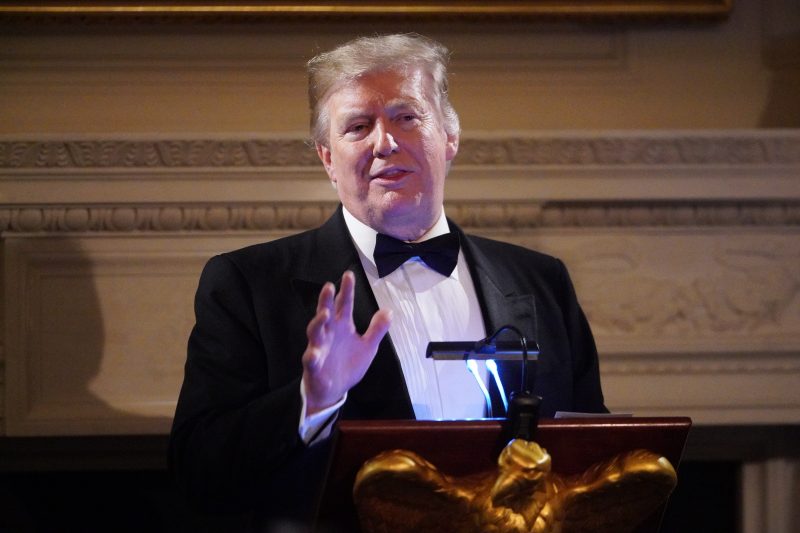US to delay China tariff increase after ‘progress’ in trade talks
US President Donald Trump and his Chinese counterpart Xi Jinping in December declared a truce in their trade war and agreed to hold off on further tariffs or retaliation for 90 days (MANDEL NGAN)
Washington (AFP) – The United States is delaying a planned increase of tariffs on more than $200 billion in Chinese exports after both sides hailed “substantial progress” made in trade talks.
US President Donald Trump also said Sunday that he planned to hold a summit with Chinese President Xi Jinping at his Florida estate Mar-a-Lago to ink a deal.
“I am pleased to report that the U.S. has made substantial progress in our trade talks with China on important structural issues including intellectual property protection, technology transfer, agriculture, services, currency, and many other issues,” Trump wrote on Twitter.
After exchanging tit-for-tat tariffs on more than $300 billion in total two-way trade, Trump and Xi in December declared a truce and agreed to hold off on further tariffs or retaliation for 90 days.
Trump initiated the trade war, which ate into company profits and contributed to stock market plunges, because of complaints over unfair Chinese trade practices — concerns shared by the European Union, Japan and others.
“As a result of these very productive talks, I will be delaying the U.S. increase in tariffs now scheduled for March 1. Assuming both sides make additional progress, we will be planning a Summit for President Xi and myself, at Mar-a-Lago, to conclude an agreement. A very good weekend for U.S. & China!” Trump tweeted.
China’s official Xinhua news agency echoed those sentiments, saying the two sides “made substantial progress on specific issues” such as the transfer of technology, intellectual property protection, non-tariff barriers, the services sector, agriculture and exchange rates.
The delegations “came a step closer to realizing the important consensus reached” by Trump and Xi when they agreed to the truce in December, it added.
The report said the parties also agreed to “carry out follow-ups in accordance with the instructions of the two heads of state.”
Trump had already expressed optimism about the negotiations Friday after meeting with China’s vice premier Liu He, who led the Chinese side for the talks that concluded Sunday.
– Steps forward –
Tokyo stocks opened higher supported by optimism over the deal that also lifted US shares. The benchmark Nikkei 225 index gained 0.59 percent, or 125.58 points, at 21,551.09 in early trade, while the broader Topix index was up 0.58 percent, or 9.32 points, at 1,618.84.
The dollar fetched 110.76 yen in early Asian trade, against 110.75 yen in New York Friday.
In Tokyo, some China-linked shares were higher, with construction machinery maker Komatsu up 1.71 percent at 2,873 yen and electronic parts maker Rohm up 2.05 percent at 7,460 yen.
Xi also struck a positive tone in a letter Liu delivered to Trump, saying he hoped the negotiations would be held in a “win-win” spirit that would lead to a mutually beneficial agreement.
The Chinese president expressed hope that the talks maintain “a mutually respectful, cooperative and win-win attitude” and lead to a “mutually beneficial” agreement.
Trump said Friday that an agreement on currency manipulation will be included in the trade pact, but otherwise few details have been made public.
The seven-month-old trade war has rattled global markets and prompted stark warnings about the risks to the world economy.
Analysts say the two sides are likely to trumpet mutual agreements to resolve the easier parts of the trade dispute — increasing purchases of American goods, more open investment in China and tougher protections for intellectual property and proprietary technology.
The harder parts covering issues such as scaling back China’s ambitious industrial strategy for global preeminence, meanwhile, are another question.
Beijing has reportedly proposed a significant increase in its imports of US energy and agricultural exports. Still, a broader deal could be difficult given the US demands for far-reaching structural changes.
China’s retaliation has hit US farm exports hard. The US Agriculture Department estimated this month that US soy exports would not return to their pre-trade war levels for another six years.
burs-oh/it
Disclaimer: This story is published from a syndicated feed. Siliconeer does not assume any liability for the above story. Validity of the above story is for 7 Days from original date of publishing. Content copyright AFP.


